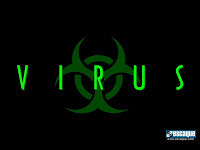
 By Tom Simmons
By Tom SimmonsThe Internet is tremendous. Its ability to network and allow people from all over the world to communicate through their computers has allowed it to accrue unimaginable amounts of information you can reach just by typing in the right words. But this easy access to information is not always good.
Nowadays, when computers find information on the internet, they are also susceptible to finding unwanted viruses that could corrupt their equipment, leaving you with either lost files or - worse - a lost computer. That's why it's important to keep your computer protected.
The Best Offense...
If you can, don't try and fight a virus after it has already infected your computer. Most times, if an infection has already occurred, you have already lost the battle. By purchasing an anti-virus program you can help successfully prevent a virus from ever corrupting your computer. These programs will generally have periodic scans of your hard drive to seek out any potentially corrupted or infected files. If the program does find any threats, it will notify you and either "quarantine" or delete the file, preventing it from corrupting anything else. And make sure to keep your program updated. As time progresses, new and more complex viruses are being created, which means your computer has to enhance its security, as well.
And though your program will initiate its own weekly scans, you should also feel free to scan manually if you suspect something's wrong with your computer - that is, if it's showing "symptoms" of being corrupted. If for whatever reason your computer is not working as well as it normally does, consider that a symptom, and initiate a scan to make sure that nothing is wrong.
A file attached in an email is an easy way for a corrupt file to breach your computer's system. With that in mind, make sure to scan any attachment before downloading it, and avoid them in general as much as you can.
Back-Up Everything
Although the use of anti-virus software will aid greatly in preventing your computer from being infected with a virus, there is always the slight probability a virus can slip through and still hit you where it hurts. That's why you should also save your different files in different locations. This is known as "backing-up" files. This keeps your files safe elsewhere if they are lost on your hard drive. Don't only save files on your hard drive. Copy them to an external hard drive, as well. Another good source for backing-up files is the internet. Many email services can hold hefty amounts of memory. Use the extra storage space to your advantage by filling it with anything you wouldn't want lost if your computer died.
It is important to safeguard your computer any way you can in order to prevent the loss of any valuable equipment or information. Not only should you have the proper software to help you fight off viruses on a daily basis, but also make sure to keep an eye out for any potentially threatening links or downloads while surfing the web. Though the internet is an incredible resource for nearly everything, you must use it responsibly and carefully.
About the AuthorNorth Star Network Security Services NY http://www.northstarli.com North Star Networks Inc. is an Information Technology Consulting company that specializes in providing technology solutions to meet the needs of any sized business. Network support not only includes highly efficient network design, support and integration, but the core of our vision is Proactive Network Support.
Submitted by Tom Simmons at http://NewSunSEO.com
Save gas! Convert your car to burn water.




No comments:
Post a Comment